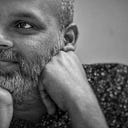When beauty is gone, she sends love.
Seeking beauty amid fear and hate.
A year back, I wrote an article titled ‘Why are we drawn to beauty?’. Makoto Fujimura, in his book Culture Care, argues that “Beauty feeds our souls.” We are drawn to beauty because it feeds our souls. Our longing for beauty tells us that we are not just bodies, but we also have a soul. Then I started asking myself, what do we do if we don’t find beauty? Should we starve our souls? Can we live without it?
When I say beauty, I don’t mean what the cosmetic industry or fashion industry means by it. ‘Sugar-coated beauty’ is not what I mean. C.S.Lewis says, “The books or the music in which we thought beauty was located will betray us if we trust them; it was not in them, it only came through them, and what came through them was longing…” In modernity, beauty has been seen as mere appearance or ornamentation. So is it possible that something with harmony, proportion, symmetry, the ideal form yet lacks beauty?
One of my favorite hill stations in South India is Kodaikanal because of its beautiful lake. I wish I could live the rest of my life in the sight of this lake. Last year, we were there again. The lake looks magical when the cloud comes over it and covers it for a few minutes and then disappears. The walk around the lake is so refreshing, particularly around some corners with Water Lilies and Calla Lilies all over.
After my visit, what I read online about the lake really disappointed me. The lake was poisoned with mercury by the Hindustan Unilever thermometer factory between 1987 and 2001.
With the protests from the locals and public interest groups, the company was made to shut down the factory in 2001. Locals suffered from kidney-related ailments due to this poisoning.
After reading this, for me, beauty left the memories I had of the lake. Why did I feel so? Is it just a feeling? Hans Urs von Balthasar In his book ‘The Glory of the Lord’ writes “…beauty demands for itself at least as much courage and decision as do truth and goodness, and she will not allow herself to be separated and banned from her two sisters without taking them along with herself…”. In other words, Balthasar says when truth and goodness are removed, then beauty leaves. A lake polluted with mercury is not good for life to thrive. That is the reason those memories were not beautiful to me anymore.
Then I asked myself, ‘so, what do I do’? I don’t see beauty in many parts of the world. So, should I erase this lake from my memories and go find another beautiful lake to satisfy my musing? Should I deny beauty as an illusion and just focus on my survival? The public interest groups in Kodaikanal did not think that way. They fought to stop the factory so that it would not pollute any further. They sought truth, goodness, and beauty; therein, they found love. Love to protect and care for the lake, so that it can be restored and, if possible, made even more beautiful.
They sought truth, goodness, and beauty; therein, they found love.
Again from Balthasar, “We can be sure that whoever sneers at her (beauty) name as if she were the ornament of a bourgeois past — whether he admits it or not — can no longer pray and soon will no longer be able to love.”
So, if I despise beauty, will I not be able to love? As Blaise Pascal once said, “There is a God-shaped vacuum in the heart of each man which cannot be satisfied by any created thing, but only by God, the Creator.” In the same way, aren’t we also created to long for beauty in our lives? When we indeed long for beauty, we will find love.
For example, a sculptor, when she imagines a conception of beauty in her mind, labors in love until she forms the clay to reveal it. Longing for beauty is the motivation for love.
Longing for beauty is the motivation for love.
Ida Scudder longed for beauty when she saw the cruelty of the death of three women during their childbirth in Vellore, India. Though her dad was a missionary doctor, he could not save them because these women did not want to be treated by male doctors due to their orthodox customs. This longing led her to study medicine and dedicate all her life to bring better health care to South Indian women. She fought against bubonic plague, cholera, and leprosy. She founded CMC Vellore in 1900. She longed for beauty in the lives of people suffering from disease and pain.
Longing for beauty means longing for goodness, truth, justice, and wholeness in our communities and ecologies. In other words, it is longing for God, who is the source of infinite beauty. When we long for this beauty, God fills us with His love so that through it, beauty can be restored.
Jesus said, “…perfect love drives out fear.” Fear leads to indifference, hate, injustice, selfishness, envy, etc. We have become slaves to fear; that is why it is not easy to seek beauty in our relationships, communities, environment, work, and charity. When I seek beauty in my neighbor, I desire their wellbeing over mine. If I don’t seek beauty, I starve my souls to the point where I “can no longer pray and soon will no longer be able to love.”
Beauty is shouting to our weary souls and challenging us to seek it. If we seek her in our families, neighbors, communities, businesses, etc. then it will teach us to truly love. Can we dare to seek beauty? Only then can you see her return to our broken world in “uncontained splendor around the double constellation of the true and the good.”

